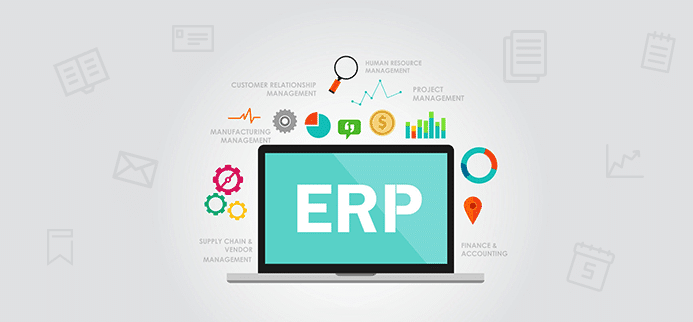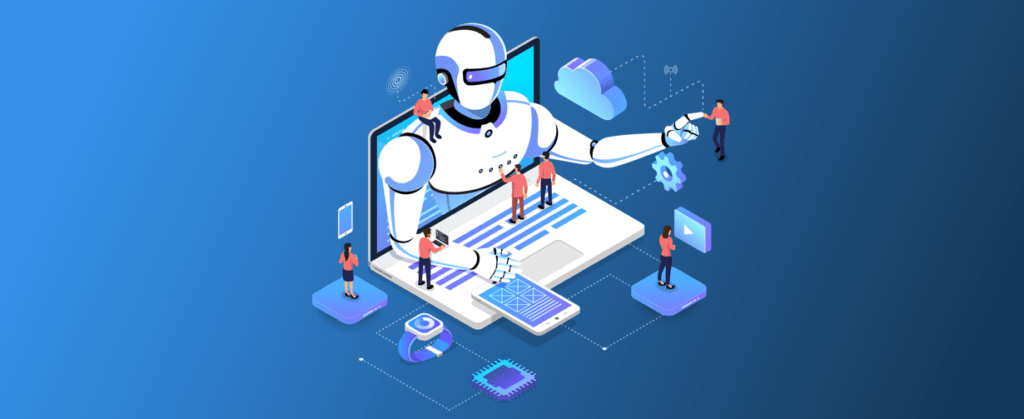In recent years, the use of AI ERP systems has become increasingly popular. With the help of AI, ERP systems can now automate mundane tasks, optimize business processes, and provide valuable insights to decision-makers.
According to a recent report, the ERP software market is projected to surpass around USD 136.1 billion by 2032. Furthermore, it is poised to reach a CAGR of 10.5% from 2023 to 2032, owing to the Rapid Uptake of Cloud Services and Mobile Applications.
However, along with the advantages come some challenges that organizations must be aware of. This blog will discuss the benefits and challenges of AI ERP systems and provide solutions to overcome these challenges. First, let’s understand what AI ERP systems are.
What is AI ERP?
AI ERP: Empowering Smarter Business Management with Artificial Intelligence
ERP is software that integrates all business functions in one place. There has been a significant evolution in this sector, and AI (artificial intelligence) in ERP has recently brought tremendous change. It is paving the way toward excellence with ERP development.
Without the influence of AI, ERP’s primary function was to integrate business activities. These include data reporting, planning, marketing, sales inventory, purchase, human resources, and finance.
The AI powered ERP is a new way of planning business activities with more ease. When Artificial Intelligence is combined with an ERP system, there are multiple benefits that companies could benefit from.
Some remarkable examples of AI ERPs are interactive chatbots, AI-enhanced financial planning, and warehouse management.
How does AI ERP Work?

AI technology has revolutionized business operations by enabling natural language user interfaces, deep machine learning, and image recognition. This helps to simplify complex data volumes. Moreover, Integrating AI technology into ERP software provides firms with invaluable insights and advantages.
Traditionally, ERP software streamlined data from various segments and centralized it in one place for easy access. However, human interaction in the process created room for human error. With the incorporation of AI, the software learns to work more efficiently and reduces human errors by automating computer processes.
For instance, AI-driven chatbots have significantly improved the consumer experience by providing instant solutions. That too without the time lag of contacting the right person in the business.
Similarly, in marketing and sales, ERP with AI software can track trends and target markets. Furthermore, it provides insights that help companies contribute their market share in a particular segment.
AI ERP can optimize various operations such as financial management, forecasting, warehouse management, etc. Therefore, integrating AI technology in ERP systems provides exemplary advantages to businesses in terms of improved efficiency and better decision-making.
What are the Advantages of AI ERP?

AI-powered ERP is a trend that can radically change business functions. It can help you make the best future business decisions based on past data. Let’s understand how-
-
AI ERP Enables Intelligent Data Processing.
ERP software allows the business to store data from departments like finance, warehouse, human resources, etc. Still, it fails to process the stored data at a supersonic speed. Data processing is important for a business to make informed decisions; therefore, ERP alone cannot do so.
AI ERP allows you to tap the real-time data from various departments and contemplate decisions for efficiency in the business. AI works with human intelligence, preparing a report with similar data and providing the best results with minimal human intervention.
For instance, AmerisourceBergen was using manual spreadsheets and data to consider the factors affecting price in the market. However, as they used automated AI-driven ERP, their efficiency increased with the reduction of time from eight hours to one hour. They invested it in value-added activities.
So, in this way, intelligent data processing would be possible with AI ERP.
-
AI ERP Offers Accurate Forecasting.
Forecasting is an integral part of business activities as plans rely on the forecast. It provides a benchmark for the business to monitor its performance and reduce the chances of uncertainty. AI-driven ERP helps businesses to improve their forecasting efficiency.
How?
It analyzes data on demands, workforce, cash flow, and other core elements, and then the AI software designs the solutions with this data. It is an important element in bridging the gap between prediction and actual requirements in the business.
In addition, businesses can read the data sets from past experiences and analyze them for future operations. Thus, it helps to make accurate decisions in the business.
-
AI ERP Supports Integrated and Advanced Analytics.
AI can work with large chunks of data. Therefore, AI ERP development helps businesses analyze their large chunks of data to gain real-time insights into their operations.
The traditional ERP software could present in-depth data on historical performance. In contrast, AI-powered ERP takes one step ahead and presents predictive analytics data, which helps make decisions.
This helps businesses reduce their workload, analyze their performance, and make informed decisions.
-
AI ERP Incorporates Personalization.
AI helps generate customized reports per the business’s requirements. The AI ERP helps extract the data and generate insightful business data specifically designed for the business.
In AI ERP, automated data extraction, calculation, and reconciliation eliminate manual errors. Likewise, it generates a personalized effect and recommendations based on user preference and behavior.
Moreover, it also analyzes them with the business requirements, and therefore, it adds more value to the organization.
-
AI ERP Increases Process Efficiency.
The business process involves the entire organization and the implementation of operations. With the traditional ERP system, there is room for manual error. This error is reduced by including AI in ERP, which involves better analysis of historical data and the presentation of solutions based on these data.
The efficiency will involve:
- What future actions can businesses take based on data analysis?
- What activities can a demand fulfillment program include?
- Moreover, what expenses do businesses need to incur to meet market demand and similar program requirements?
However, as there are advantages, AI is software, and there can be certain challenges that businesses might face in the future.
What are the Challenges to AI ERP?
Implementing artificial intelligence in ERP systems brings forth a multitude of opportunities and benefits. However, it also poses several challenges that need to be addressed for successful integration and adoption. Below are some of the key challenges to AI in ERP systems:
-
Data Quality
AI ERP is effective when the data feed is complete and adequately trained. However, if there is incomplete or inaccurate data, there might be problems while analyzing it. Furthermore, with this preliminary data, informed decisions for the future cannot be made, thus posing a challenge to ERP development in terms of data quality.
-
Privacy Concern
Privacy is a matter of concern every time we use new technology. AI ERP will be based on data and could collect and analyze some sensitive data. This might create privacy and security problems. However, partnering with a reputed IT company will address this challenge.
-
Implementation Costs
AI ERP development services are costing businesses huge bucks. It is cost-efficient for large businesses. However, small businesses would refrain from using it as their cost for total business operations would increase. This might pose a severe challenge for businesses.
-
Neutrality
If the AI data feed is biased, then it would bias the data and its prediction analyses. Consequently, the business would eliminate the fairness game, which can be played manually. Everything in the AI depends on the data; therefore, the data must be neutral to get unbiased results.
Also Check: Cloud-Based ERP: Why It’s Becoming the Standard for Businesses
Bottom Line
Artificial intelligence ERP systems have the potential to transform businesses by automating tasks, optimizing processes, and providing valuable insights. However, organizations must be aware of the challenges that come with the implementation of these systems and take measures to overcome them.
By investing in data management, training, security, and integration, organizations can reap the benefits of AI ERP systems and stay ahead of the competition. Advansappz is one reliable resource for getting the highest level of technology consultation for a secure platform and cybersecurity services.
Frequently Asked Questions about AI ERP
-
How is AI being used in ERP?
ERP uses AI to automate repetitive tasks, predict demand, optimize inventory, and enhance decision-making processes.
-
How is AI ERP helpful?
AI improves efficiency, accuracy, and speed in data processing, analysis, and decision-making. Thus, leading to better resource utilization and cost reduction.
-
What is an example of AI ERP?
An example is using AI algorithms to analyze historical sales data and predict future demand. It helps inventory management and production planning within an ERP system.
-
How can ERP use Generative AI?
ERP systems can use Generative AI to create synthetic data for testing and generate diverse scenarios for decision-making simulations. Moreover, it can even automatically generate design options for products.
-
How will AI and IoT shape the future of ERP systems?
AI and IoT will enable real-time data collection, analysis, and decision-making in ERP systems. Thus, leading to proactive maintenance, predictive analytics, and enhanced supply chain visibility.












